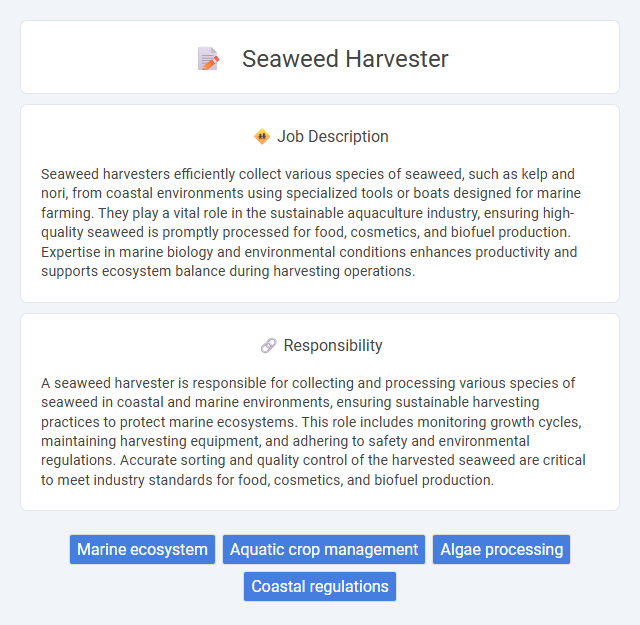
Seaweed harvesters efficiently collect various species of seaweed, such as kelp and nori, from coastal environments using specialized tools or boats designed for marine farming. They play a vital role in the sustainable aquaculture industry, ensuring high-quality seaweed is promptly processed for food, cosmetics, and biofuel production. Expertise in marine biology and environmental conditions enhances productivity and supports ecosystem balance during harvesting operations.
Working as a seaweed harvester likely requires individuals to adapt to physically demanding and outdoor environments, often involving extended hours in wet and variable weather conditions. People with good physical stamina and a tolerance for repetitive manual tasks may be more suitable, while those with limited mobility or sensitivity to harsh environmental factors could find the job challenging. The probability of success in this role may increase for individuals who possess resilience and a willingness to work in isolated or remote coastal areas.
Qualification
Seaweed harvester jobs require physical stamina, knowledge of marine ecosystems, and experience with harvesting techniques specific to different seaweed species like kelp and wakame. Qualifications often include certification in boat safety and marine handling, as well as familiarity with environmental regulations regarding sustainable harvesting. Proficiency in operating harvesting equipment and ability to work in varying weather conditions are essential for efficiency and safety.
Responsibility
A seaweed harvester is responsible for collecting and processing various species of seaweed in coastal and marine environments, ensuring sustainable harvesting practices to protect marine ecosystems. This role includes monitoring growth cycles, maintaining harvesting equipment, and adhering to safety and environmental regulations. Accurate sorting and quality control of the harvested seaweed are critical to meet industry standards for food, cosmetics, and biofuel production.
Benefit
Working as a seaweed harvester likely offers significant environmental benefits, as it supports sustainable aquaculture and promotes marine ecosystem health. The job may provide opportunities for physical activity and outdoor work, which can contribute positively to personal well-being. Earning potential could vary depending on location and experience, but involvement in this growing industry might improve career prospects.
Challenge
Seaweed harvester jobs likely involve physically demanding work due to the need to navigate aquatic environments and handle heavy or slippery materials. Challenges may include exposure to harsh weather conditions and the requirement to operate specialized harvesting equipment efficiently. There is a probable risk of injury from sharp tools and marine life, making safety precautions essential.
Career Advancement
Seaweed harvester jobs offer career advancement through specialization in sustainable aquaculture techniques and management roles overseeing large-scale harvesting operations. Professionals can progress to positions such as marine resource managers, quality control supervisors, or research analysts in marine biology. Developing expertise in environmentally friendly extraction methods and regulatory compliance enhances opportunities for leadership within the seaweed farming industry.
Key Terms
Marine ecosystem
Seaweed harvesters play a crucial role in maintaining the balance of marine ecosystems by sustainably collecting seaweed that supports biodiversity and acts as a carbon sink. Their work helps prevent overgrowth that can disrupt habitats for marine species and ensures the continuous health of coastal environments. Proper harvesting techniques contribute to the regeneration of seaweed beds, promoting water quality and supporting marine life sustainability.
Aquatic crop management
Seaweed harvesters specialize in aquatic crop management by cultivating, monitoring, and collecting various species of seaweed in marine environments. They ensure optimal growth conditions through the assessment of water quality, nutrient levels, and environmental factors to maximize yield and maintain sustainable harvesting practices. Tasks also include maintaining farming equipment and adhering to regulations that protect coastal ecosystems while supporting the commercial production of seaweed for food, cosmetics, and biofuel industries.
Algae processing
Seaweed harvesters play a crucial role in algae processing by collecting various species of marine algae used in food, cosmetics, and biofuel industries. Skilled in identifying optimal harvesting times and sustainable techniques, these workers ensure high-quality raw material for extraction of valuable compounds like agar, carrageenan, and alginate. The efficiency of the processing pipeline directly depends on the precision and expertise of seaweed harvesters in maintaining algae freshness and minimizing contamination during collection.
Coastal regulations
Seaweed harvesters must navigate strict coastal regulations to protect marine ecosystems and ensure sustainable harvesting practices. Compliance with local environmental laws includes obtaining permits, adhering to seasonal quotas, and avoiding restricted zones to prevent habitat destruction. Understanding and following these regulations helps maintain seaweed populations and supports the long-term viability of the coastal economy.
 kuljobs.com
kuljobs.com